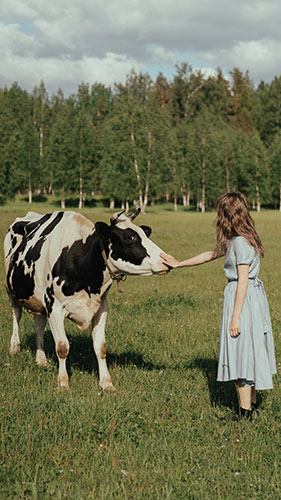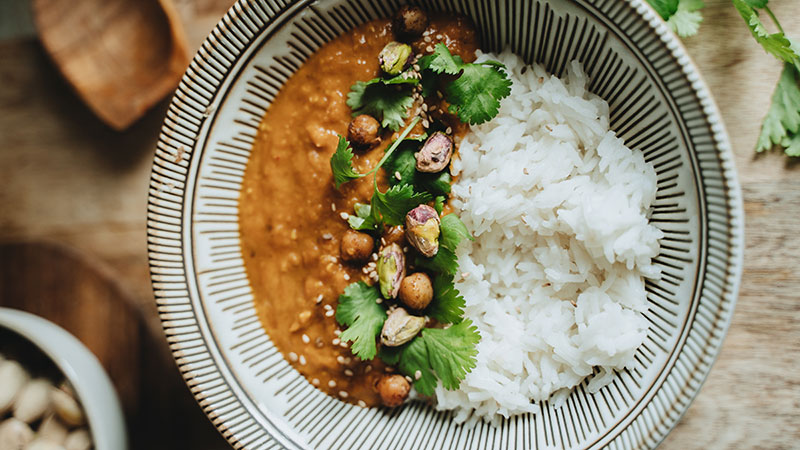If you’re here, you are probably trying to dive a little deeper into your yoga practice and you are trying to figure out what it all entails. Because yoga is a holistic practice, it doesn’t just concern your physical practice. You can factor yoga into pretty much everything you do. Of course, it is up to you to decide how you want your yoga practice to look like and which parts of yoga you want to incorporate into your life.
An area in which a lot of yogis take the principles of yoga into consideration is diet – specifically, many yogis choose to eat a plant based (vegan) diet. Why is that? Is yoga plant based? And if you don’t follow a vegan diet, does that mean that you are not practicing yoga properly?
As with most things in life, there isn’t a black and white answer to these questions. Let’s have a look at some of the reasons why some yogis go vegan and some don’t.
Plant-based diet for better health
Many yoga students try to adopt a vegan (or a mostly vegan) diet simply because of health reasons. Eating unprocessed, plant-based foods reduces the risk of most diseases which are widespread in the last couple of decades. Avoiding saturated fats common in animal products, eating enough fibre and choosing natural ingredients that aren’t filled with chemicals is hugely beneficial to your health, and a vegan diet is much more likely to help you achieve those goals. To learn more about plant-based foods and their effects on the body, we recommend reading How Not To Die by Michael Greger.
For the above reasons, yoga practitioners often conclude that avoiding animal products is the healthier choice for their bodies which will, in turn, help them progress on their journeys of yoga.

Yogic principles
Apart from health reasons, yogis also often opt for a vegan option because of moral reasons. In other words, they are trying to follow the principles of yoga in their everyday lives, and that includes the foods they eat. One of the main principles when it comes to our diet is ahimsa, which is usually translated as non-violence. Ahimsa is the first of the five principles of yama. Principles of yama contain what can be described as a moral code for yoga practitioners. Ahimsa is one of the core principles of yoga. Yogis often feel that keeping livestock animals in appalling conditions and slaughtering them so that their meat can be mass sold in supermarkets is incompatible with the principle of non-violence. That concerns dairy and eggs, too, because milk cows are forcibly impregnated and their calves killed after birth so that they keep producing milks, and hens are equally kept in terrible conditions. Supporting the meat industry by purchasing animal products is something that many yogis are not willing to do.

So yoga IS plant-based, right?
Not necessarily. Yoga rarely gives its followers clear-cut rules; rather, it gives them general principles and suggestions which they can then implement into their lives as they see fit. Not all yogis eat solely plant-based foods.
First of all, being vegan does not necessarily equal being healthy. There are lots of vegan foods that are highly processed and full of chemicals, and these definitely aren’t ideal. Overall, eating vegan junk food is definitely not better than eating a diet full of vegetables, fruits, grains and legumes, with a little bit of meat or dairy products here and there.
When it comes to the principle of non-violence, the answer also isn’t black and white. While mass factory farming is decidedly awful, there are also small farmers who ensure that their animals have a good quality of life and are fed naturally. Many yogis who are not vegan get their meat, eggs or dairy from sources like these, which are definitely more ethical. Again, they might be even more ethical than some of the processed vegan products which put an incredible amount of strain on the environment.
What do ancient yogic texts say about diet?
You might be surprised, but yogic texts do not preach veganism. Ancient yogis used to eat a diet composed of so called sattvic foods which were nourishing and easy to digest. This is set out, for example, in the famous scripture called Bhagavad Gita. Sattvic ingredients include fruits, vegetables, grains, legumes, nuts and seeds, but also dairy. In fact, a commonly used ingredient among ancient yogis was ghee, which is derived from butter.

Most yogic texts do recommend a diet which does not contain meat. That means that, if anything, a traditional yogic diet is vegetarian rather than vegan.
What does that mean for me?
Yoga may be predominantly (or even fully) plant-based, but first and foremost it is non-judgmental. Yoga recommends certain principles to you and it is up to you to figure out if you want to observe them and, if so, then how. This is why different yoga students will have different approaches to their diet. The main point is to educate yourself, keep an open mind, and – most importantly – keep trying to make small and sustainable changes where you can.
Best of luck and bon appetit!
